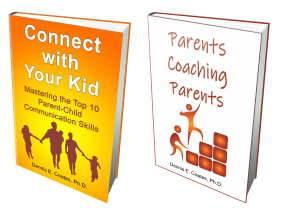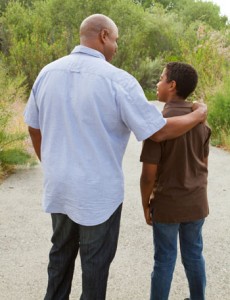A young father was telling me about his two children, a seven-year-old girl and a three-year-old boy.
“My daughter is an angel, but my little boy is a terror. He defies me every chance he gets. At lunch I asked him to come to the dinner table and he refused. That earned him another time-out.”
I said to him, “You’re trying to be a good dad, and I can see that his behavior would frustrate you. But consider this: maybe he’s a little guy who is just now becoming aware that he’s a person, and he’s trying to assert his sense of self. Which would be a good thing for his development, right? If you can empathize with that, maybe you just express it. Something like, ‘You’re not hungry right now and you don’t want to come to the table.’ Then you just eat without him. It would be interesting to see how he reacts to that approach.”
Then the dad and I began talking about home construction, but the next day he gave me this feedback: “That one insight you gave me had an amazing effect on how I see myself as a dad. I’m seeing my son with new eyes. I can’t thank you enough.”
That incident reminded me of how a single thought, a simple shift in attitude, can change what you think, feel, and do.
In my life, lots of thoughts have had a powerful effect on me. For example, from time to time someone will do something that in the past would irritate me. Now, I think to myself, “He means no harm. He’s probably doing the best he can with circumstances I’m not aware of.”
I learned to do this from my wife’s example. She nearly always gives people the benefit of the doubt.
It’s about receiving wisdom and letting it affect your thinking and behavior.
When I was a kid I had two loving parents who did the best they knew how to provide food, clothing, shelter, and safety for me and my seven siblings. You don’t get to choose your parents, and I feel pretty lucky to have had mine. But wisdom—empowering thoughts—were not something they passed on to us. My father’s mom had a fourth-grade education. She was the sweetest grandmother anyone ever had, but she had a wide-eyed, perplexed view of the world. So she had little or no wisdom to pass on to my father. My mom didn’t graduate from high school, and her attempts to share wisdom were expressed as sayings such as “birds of a feather flock together” and “curiosity killed the cat.” So I could have used more wisdom while growing up. I was naive as a young man and didn’t discover wisdom in a big way until my graduate school years at Duke, where I studied the great novelists, poets, philosophers and psychologists of the last two centuries. I now have a collection of about 3,000 favorite quotes from these authors. A literal vault of wisdom!
Do you have your own collection of wisdom? When your child comes home upset from something unkind someone has said, maybe you can offer something like this: “People have bad days. You’ve had days when you were mad about something. Maybe he was having a bad day.” Or: “Good days don’t just happen. You make them happen. What will you do tomorrow to have a good day?”
Wisdom. Empowering thoughts that we plant in the fertile minds of kids.
My how-to book about communicating with your child: Connect with Your Kid: Mastering the Top 10 Parent-Child Communication Skills.
 This book, along with Parents Coaching Parents, will help you make change happen.
This book, along with Parents Coaching Parents, will help you make change happen.
You can grow the bond with your child through better listening. Download the FREE ebook, Listening to Understand.

